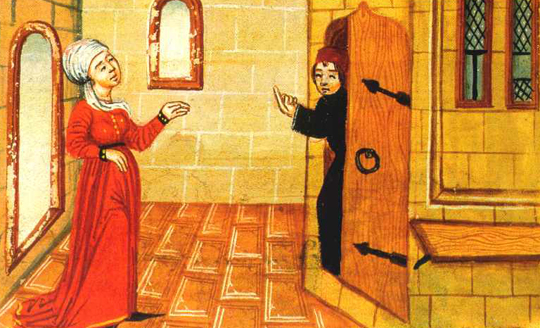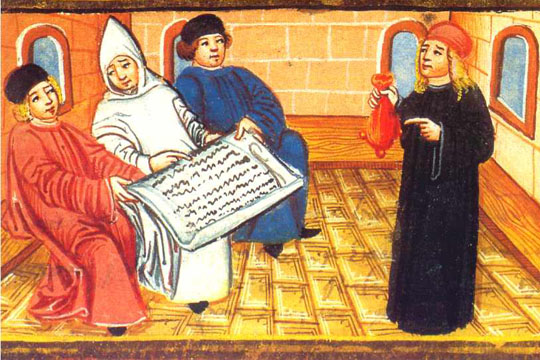A College of Wisdom
Freiburg, Mar 23, 2017
They sponsor students when they study abroad and do research, support scholars working on projects, and give instructors opportunities to implement new ideas in their seminars and lectures. The 51 foundations of the University of Freiburg all carry the unmistakable characters of their founders. Sarah Schwarzkopf is presenting some of these organizations in a series.

At the Collegium Sapientiae "Masters and scholars" were to take their meals together. Photo: University Archives Freiburg A0105/8141, fol.26v
Sapienz (Kerer), or the Johann Kerer Foundation, is the oldest foundation of which there is evidence in the University Chronicles. It was established in 1497, just a few decades after the university itself. Its founder, Johann Kerer, is known as a model for all the donors who over the following centuries chose to bequeath part of their wealth to the University of Freiburg. Kerer, the son of a poor weaver, came from Wertheim in Franconia. A scholarship foundation made it possible for him to register as a cleric in Heidelberg, where he completed his studies at the university with a Master's degree. Afterwards his path took him to Freiburg in 1457, the year that the university was founded. During his successful academic career he bought many buildings in the city and amassed a considerable fortune.
Already back then, Kerer was an important individual at the University of Freiburg. He taught as a professor of theology and also worked as a parish priest at the Freiburg Minister. After a number of years passed, he went to Augsburg, where he held the office of suffragan bishop. He died there in 1507 after a severe illness. His tombstone was later returned to Freiburg.
Illuminated charter
Perhaps Kerer's experience in Heidelberg inspired him to bequeath his fortune to establish a foundation. His aim was the "promotion of the poorest and most able youth from at home and abroad. They were to study a chosen subject in-depth and achieve the level of doctor of the faculty of arts." In his wills he established the second student hostel in Freiburg, which was to become the most long-lived and famous in town. It was called Collegium Sapientiae – a college of wisdom.

A clear statement from the charter: "No one is to bring a suspect wench into the House of Wisdom." Photo: University Archives Freiburg A0105/8141, fol.31r
Grants for the gifted and needy
A scholarship provided for 12 students to live in the hostel. Kerer set out the rules for living in this community in an illuminated charter, whose 88 articles are illustrated with sumptuous miniatures. The book of statutes is one of the most valuable pieces of the Uniseum – the Forum and Museum of the University of Freiburg – that displays copies and offers postcards of it. Traces of the College of Wisdom are also still present in the city today. On Herrenstraße there are inscriptions over two late Gothic entryways that indicate the location of the former Collegium Sapientiae.
At the end of the 18th century, the university auctioned the property off, but the study foundation remained under the name Sapienz (Kerer). It provides scholarships and grants to gifted and needy students of all disciplines. They may submit their applications directly to the foundation's administration. The Sapienz (Kerer) Foundation belongs to the United Academic Endowment Holding and distributed around €2,100 in 2016.

Nicht auf Schulden sitzen bleiben: Repay debts quickly: "Scholarships are repaid when a student achieves prosperity." Photo: University Archives Freiburg A0105/8141, fol.51v
Foundations of the University of Freiburg
Some of the 51 foundations of the University of Freiburg date back to the Late Middle Ages. The 17 oldest ones form the United Academic Endowment Holding, while the newer ones – with three exceptions – belong to the Endowment Funds. The university receives capital stock in the form of real or monetary assets and invests it. Each year it distributes two-thirds of the earnings of each foundation, while the remaining third is put aside to compensate for inflation. The donors determine who may apply for aid. As a rule, need is considered more than ability. The founders have also defined in statutes the individual aims of their respective foundations.

